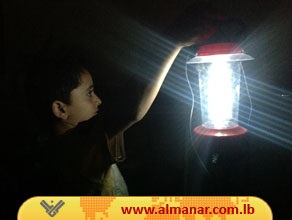Al-Manar website team headed towards some Lebanese southern villages in a bid to highlight the conditions of the Syrian refugees settling there.
Marwa Haidar - Israa Al-Fass
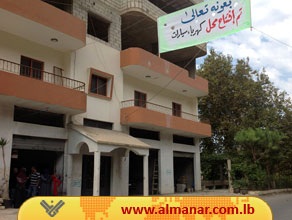 “With God’s assistance, a store for cars electricity was inaugurated…” this was written on a signboard lifted on one of Jbaa’s main streets, the southern village that hosted tens of Syrian families who fled their country following the unrest there.
“With God’s assistance, a store for cars electricity was inaugurated…” this was written on a signboard lifted on one of Jbaa’s main streets, the southern village that hosted tens of Syrian families who fled their country following the unrest there.
“Abu Hisham” is one of hundreds of Syrian refugees who settled down in south Lebanon. He works in the domain of cars electricity, and with the help of the Jbaa villagers, “Abu Hisham” used his expertise in the southern village that lacks such profession.
It wasn’t weird that the southerners welcome Syrian families, because they, themselves, suffered as they fled their country before their guests during July war in the year of 2006.
And since the Lebanese south didn’t grab media attention as different regions, Al-Manar website team headed towards some southern villages in a bid to highlight the conditions of the Syrian refugees settling there.
SIDON: SYRIAN CURRICULUM APPLIED IN SCHOOLS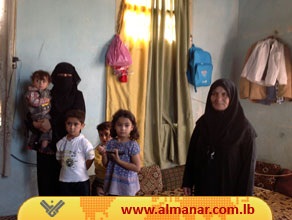 Our tour started from Sidon, as we met “Mohammad”, one of the “Association of Muslim Students”, the educational brand of “al-Jamaa al-Islamiyyah”. The “Association of Muslim Students “ along with other Islamic organizations in the city, showed concern with helping Syrian refugees under what was called “Syrian Refugees Relief Union”.
Our tour started from Sidon, as we met “Mohammad”, one of the “Association of Muslim Students”, the educational brand of “al-Jamaa al-Islamiyyah”. The “Association of Muslim Students “ along with other Islamic organizations in the city, showed concern with helping Syrian refugees under what was called “Syrian Refugees Relief Union”.
According to Mohammad, what made Sidon distinguished from other regions were the educative services which Syrian students were supplied with, according to the curriculum applied in the schools of their country, as well as providing them with other requirements such as uniforms, stationery, and breakfast meals in schools.
In addition to education, Mohammad said that the Union provides medical services in Sidon governmental hospital. As for kind aid, composed of nutritive portions and other elements, families have been receiving text messages informing about distributing coupons for new portions.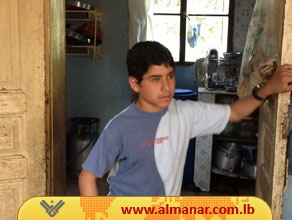
The guy, in his mid twenties, accompanied us to a house in a rural neighborhood in Sidon where four families from Damascus countryside have been living since almost five months. Among those families, 10 children were under the age of five.
The house is composed of three wide rooms, and a small kitchen equipped with the necessary materials, but the walls were cracked as the water was infiltrating.
Mohammad, a 14-year old guy, is a son of one of the families there; he studies Sharia, and hoped to graduate from Al-Azhar. He suffers from a critical health problem, but he still helps his family make a living. He picks olive for a daily wage of 15,000 L.L. (10 $).
Abra, a high-class neighborhood in Sidon, was our second stop in Sidon. There, Abu Shadi and his four-child family, among them one handicapped, live in a house located in the newly built structure.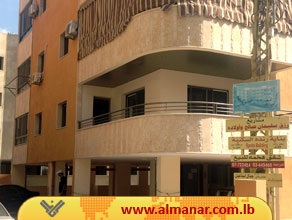
The clothes dealer who left his work at the Tal region in Damascus stresses that we mustn’t be “deceived” with the excellent condition of the building, noting that it was offered to the family by an almsgiver.
Abu Shadi said that he didn’t receive any help when he arrived at Sidon, he rather sold his wife’s jewelry to pay the family’s expenses as well as the 300$ monthly rent for a home in Majdelyoun, one of Sidon’s eastern suburbs.
After that, he rented a taxi car in exchange of daily fees, and his daughter started working at one of the city’s bakeries to help the family pay its expenses. Later on, “Abu Youssef”, a man from Sidon, offered the family the fully-equipped house of his son.
Currently, the family receives aids from the “Syrian Refugees Relief Union.”
JBAA: AIDS, JOB OPPOTRUNITIES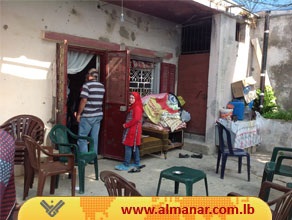
Following Sidon, we headed towards the Municipality of Jbaa (in Nabatiyyeh District), where we waited for Abbas Dhaini, who is in charge of providing the Syrian refugees in the village with aids, after the Jbaa was flooded with tens of Syrian families that left their properties there seeking security here.
"Hajj Abbas," as known in the town, explains how the municipality of Jbaa, along with Hezbollah’s Social Committee in the region, sought providing refugees with fully-furnished homes, as well as aids, free education and medical treatment.
He took us to a couple of medium-class houses located on the border-limits of the village. “Those couple of houses used to be a single one, but when Syrian families came to the village, we divided it this way,” Hajj Abbas said.
According to Um Ahmad, two “Fayyad” families live in one of those houses. They came from Bab Touma region in Damascus after many neighboring houses were targeted in the same region.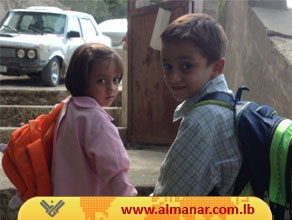
The woman, in her mid forties, says that they initially headed toward Jbaa, two months ago, noting that they didn’t expect to be treated this way. She narrates how the town’s municipality provided them with this fully-equipped home.
Furthermore, she talked about the aids either on the medical level, or the educational one in which her two children are learning and supplied with all scholastic equipments such as books, stationery, uniforms, and free transportation. “Um Ahmad” never forgets the sympathy the family received from the neighbors who contributed to find a job for her eldest son Ahmad in one of the Jbaa’s bakeries.
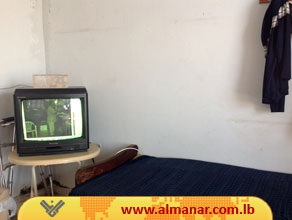
The other house is inhabited by a family from the Zein al-Abedin region. The father welcomed us on his wheelchair after being injured by the armed groups. Even though he praised the villagers’ hospitality and the municipality’s association, still appear on his face the bitterness of sectarianism spread all over his homeland.
He repeatedly mentioned that “Syria is no more as it was. The Sunni man used to marry Alawite woman, and the Shiite man from the Christian woman, but today the concept of hostility dominated in our country.”
The Syrian wounded is receiving full medical care as well as physiotherapy.
After we left his home, we thought that the tour in Jbaa has almost finished, but we were surprised by what Hajj Abbas still hides. He said: “Just five minutes, there is a family over there. Only two minutes, another family is waiting Al-Manar’s visit.”
We went with him to a house in a calm neighborhood far from the square of the village. Four families from Aleppo live there, among them are “Um Omar’s” family, a widow with her four orphans.
“Hajj Abbas” said that the social committee of Hezbollah is totally in charge of providing this family with all its needs, and they are getting prepared to move to an independent house that was equipped for them to live in.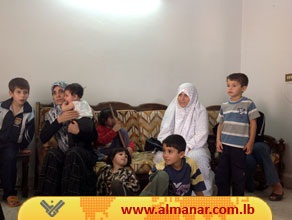
“Um Farouq”, also a mother for three children, lived with her family in the above mentioned house. Her husband, Marwan, works as a builder in the village. She says that what the family receives is limited by nutritive portions, full medical aid, and education, while the three families share the renting expenses through Marwan’s work and men of other families.
After that, we went to a neighborhood we called “the neighborhood of refugees”. Its houses are close at hand and crowded with refugees. Among them was Um Yamen who headed towards Jbaa after she heard from some relatives about the villagers’ hospitality. She praises those in charge of aids and prays for Hajj Abbas. Moreover, she wanted to deliver a message through us, saying that “I came here because I don’t trust but the southerners, they suffered once, and they well-know its pain.”
We finished our tour, and were so curious to know what the surprise Hajj Abbas had promised us to show was. He took us to a main street that links Jbaa with other villages where we read a big signboard mentioning the following: “With God’s assistance, a store for cars electricity was inaugurated.” 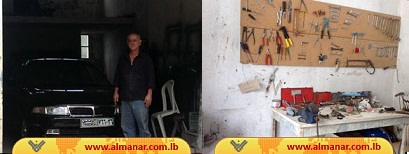
The store belongs to Abu Hisham, the Syrian immigrant whom the villagers took upon themselves paying the rent of his store and equipped it until the Syrian man becomes able to “stand up” and help his family.
“Abu Hisham” says that it was Hajj Abbas’s idea to inaugurate the store after he learned that the village lacks his profession. The latter hopes this project will be successful, mentioning that they are to open a tailoring shop for another Syrian immigrant.
TAYBEH: AIDS AVAILABE… BUT
Our third destination in the south was in the Taybeh village, Marjeyoun District. Yet Jbaa’s comfort wasn’t similar to that of the Taybeh where aids are available… but!
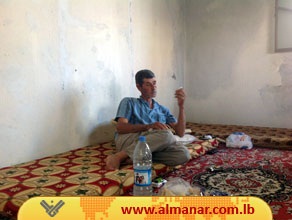 We entered the town asking about Syrian refugees there. A villager accompanied us leading us to the houses where Syrians sought refuge, some of which were for free, others are rented. The first house belongs to Wahid Al-Hariri, a sixty years old man who has been working in the village since four years. After the recent events in Syria’s Daraa, his family came to the village. He says that he didn’t receive any aid; neither did a villager knock his door.
We entered the town asking about Syrian refugees there. A villager accompanied us leading us to the houses where Syrians sought refuge, some of which were for free, others are rented. The first house belongs to Wahid Al-Hariri, a sixty years old man who has been working in the village since four years. After the recent events in Syria’s Daraa, his family came to the village. He says that he didn’t receive any aid; neither did a villager knock his door.
Al-Hariri is a cement worker; his wife helps him sometimes. She works sometime at homes, other times she helps farmers in picking olives. They rent a house for 300$ a month, and many essential equipments are not available in that home.
The wife says that she went to one of the influential figures in the village, where she registered her name since two months, but still didn’t receive any aid.
Near Al-Hariri’s house, another Syrian family resided in a house that belongs to Abdullah Sawli who says that he went to Syria during the July war, and never forgets its people’s hospitality. He says it is time to show gratitude.
The man shares with the Syrian family, composed of parents and two children, foo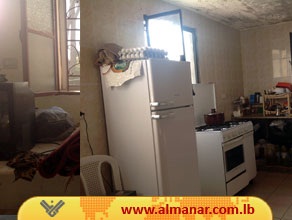 d and electricity. He had also prepared two separate rooms for them to live in. He blames those responsible for the aids in his village for their delinquency.
d and electricity. He had also prepared two separate rooms for them to live in. He blames those responsible for the aids in his village for their delinquency.
We carried Hariri and Sawli’s compliant to a person in charge of the aids. He took us to a house in the same village where two families are living in. We toured inside the house. On the contrary, we witnessed how embraced those families were, and the aids they have received.
The man explains that the Taybeh municipality cannot provide all refugees with help, noting that the government is absent and careless about refuges in the south, unlike other regions. “The municipality supplied aids, but they are still limited, and the numbers still require huger abilities,” the man said.
BINT JBEIL: MODEL OF POPULAR EMBRACING AND SOLIDARITY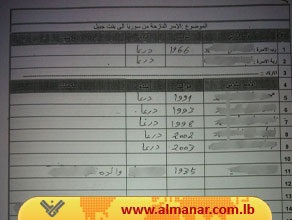
As we left Taybeh and headed toward Bint Jbeil, a city few kilometers far from the occupied Palestine, we were shocked by the numbers of Syrian refugees there, since we didn’t expect that a large number of Syrian families will refuge in the frontier city.
There, not only numbers were surprising, but also the residents’ civil communal solidarity with the refugees. They share helping Syrian families on many levels. The person in charge of the Syrian refugees’ file in the city, “A. B.”, displays the data that were accurate and organized as it show the funding sides for the aids as well as the applied mechanism in distributing them.
All the organizations, assoc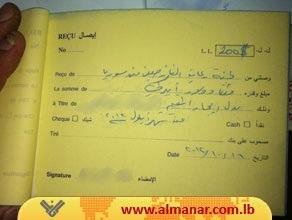 iations, and members in Bint Jbeil contribute to help the Syrian refugees. In the list of funders, he writes: Municipality, Hezbollah’s social committee office, Sayyed Mohammad Hussein Fadlallah’s social services office, the Charitable Cooperation Association, the Syndicate of the shop owners in Bint Jbeil, the Shiite Checking Committee, as well as individual supports.
iations, and members in Bint Jbeil contribute to help the Syrian refugees. In the list of funders, he writes: Municipality, Hezbollah’s social committee office, Sayyed Mohammad Hussein Fadlallah’s social services office, the Charitable Cooperation Association, the Syndicate of the shop owners in Bint Jbeil, the Shiite Checking Committee, as well as individual supports.
“The Ministry of Social Affairs doesn’t have any name of Syrian refugees in Bint Jbeil. Well-known figures in the country were in charge of providing them with what they need,” said the sixty years old man, who is also considered one of the city’s distinguished personas.
He explains that the first meeting in the city was last May; the attendees studied the ways to provide the expected refugees with equipped residences. He added that a 70000$ land was bought where residences were supposed to be built for the Syrian refugees, but the Ministry of Interior didn’t give instruction license.
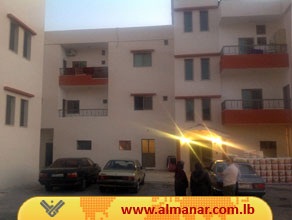 Nutritive portions are distributed on the Syrian families weekly. Among the aids were thenecessary requirements for residences which the Syrian families settled in.
Nutritive portions are distributed on the Syrian families weekly. Among the aids were thenecessary requirements for residences which the Syrian families settled in.
(A.B.) confesses that the refugees are suffering from lack of water, but he says that it is a problem from which Bint Jbeil residents are originally suffering…
As many other southern villages and cities, Bint Jbeil provides Syrian families with medical care and education for free.
“Abu Khaled”, one of the heads of families that arrived at Bint Jbeil in last June, lives with seven families in a new residential complex offered for the refugees.
As we toured in Abu Khaled’s apartment, composed of four rooms and a kitchen, we saw the equipments and furniture given to the family. Abu Khaled says that the bitterness of emigration is still sweeter than killing and destruction in Syria. Sadly he talks about the difficult circumstances in his 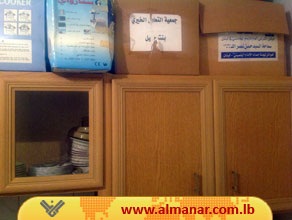 country, and puts past returning soon.
country, and puts past returning soon.
Our next destination in the border city was at residence of “Abu Mjail” tribe. Coming from Dael in Daraa three months ago, 21 families from the tribe resided in a new residential complex on the edges of the city.
“We came to Bint Jbeil not to feel loneness,” Abu Faisal, the Sheikh of the tribe says.
He received us in a terrace prepared by the city’s residence in honor of the tribe that welcomed many people from Bint Jbeil during the July 2006 war .
“They received us as if we were, maybe, dearer than their children.” He emphasizes that the Lebanese are our “brothers”.
